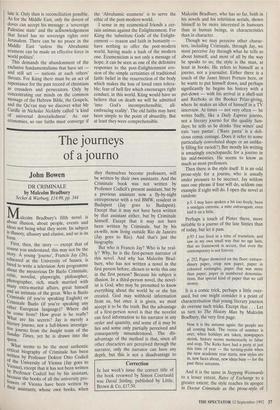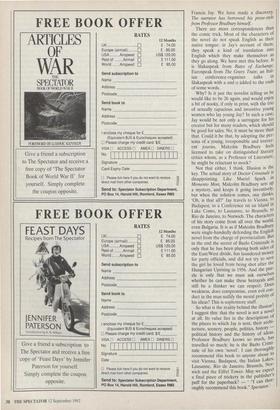The journeys of a journo
John Bowen
DR CRIMINALE by Malcolm Bradbury Seeker & Warburg, £14.99, pp. 344
INNfr
Malcolm Bradbury's fifth novel is about illusion, about people, events and ideas not being what they seem. Its subject is illusory, allusory and elusive, and so is its
form.
First, then, the story — except that of course you understand, this may not be the story. A young 'journo', Francis Jay (26), educated at the University of Sussex, is hired to write a television Arts programme about the mysterious Dr Bazlo Criminale, critic, novelist, playwright, philosopher, Photographer, rich, much married with many extra-marital affairs, great himself and an intimate of the great. Who is Bazlo Criminale (if you're speaking English) or Criminale Bazlo (if you're speaking any ether European language)? Where did e come from? How great is he really? What are his secrets? Jay is merely a literary journo, not a full-blown investiga- tive journo from the Insight team of the Sunday Times, yet he is drawn into the quest.
What seems to be the most authentic critical biography of Criminale has been Written by Professor Doktor Otto Codicil f. the University of Vienna (Jay goes to ylenna), except that it has not been written .°Y Professor Codicil but by his assistant, because the books of all the university pro- fessors of Vienna have been written by their assistants, whose own books, when
they themselves become professors, will be written by their own assistants. And the Criminale book was not written by Professor Codicil's present assistant, but by a previous assistant now a fly-by-night entrepreneur with a red BMW, resident in Budapest (Jay goes to Budapest). Except that it may not have been written by that assistant either, but by Criminale himself. Except that it may not have been written by Criminale, but by his ex-wife, now living outside Rio de Janeiro (Jay goes to Rio). And that's just the biography.
But who is Francis Jay? Who is he real- ly? Why, he is the first-person narrator of this novel. And why has Malcolm Brad- bury, who has not written a novel in the first person before, chosen to write this one in the first person? Because his subject is illusion. In a third-person novel, the novel- ist is God, who may be presumed to know everything about the world he or she has created. God may withhold information from us, but once it is given, we must accept it to be the truth. But the advantage of a first-person novel is that the novelist can feed information to his narrator in any order and quantity, and some of it may be lies and some only partially perceived and consequently misunderstood. The dis- advantage of the method is that, since all other characters are perceived through the narrator, only the narrator can have any depth, but this is not a disadvantage to Malcolm Bradbury, who has so far, both in his novels and his teleVision serials, shown himself to be more interested in humours than in human beings, in characteristics than in character.
Though we may perceive other charac- ters, including Criminale, through Jay, we must perceive Jay through what he tells us about himself, and most of all by the way he speaks to us; the style is the man, at least in books. He refers to himself as a journo, not a journalist. Either there is a touch of the Janet Street Porters here, or he wants to put himself down, and perhaps significantly he begins his history with a put-down — with his arrival in a shell-suit and Reeboks at the Booker Prize-giving, where he makes an idiot of himself in a TV interview. At times — not very often — he writes badly, like a Daily Express journo, not a literary journo for the quality Sun- days; he tells us he drinks 'fine wines' and eats 'rare pastas'. ('Rare pasta' is a deli- cious comic coinage. Does it refer to some particularly convoluted shape or an unlike- ly filling for ravioli?) But mostly his writing is amazingly encyclopaedic for a journo in his mid-twenties. He seems to know as much as most professors.
Then there is the style itself. It is an odd prose-style for a journo, who is usually under pressure to be succinct. Jay seldom uses one phrase if four will do, seldom one example if eight will do. I open the novel at random:
p.5. I may have spoken a bit too freely, been a smidgen extreme, a mite extravagant, even laid it on a little.
Perhaps a touch of Pinter there, more suitable to a journo of the late Sixties than of today, but let it pass.
p.93 I too lived in a time of transition, and saw in my own small way that no age lasts, that no framework is secure, that even the contemporary is not forever.
p. 252. Paper showered on the floor: extraor- dinary paper, crisp new paper, paper in coloured rectangles, paper that was more than paper, paper in numbered denomina- tions, that special kind of paper that we call money.
It s a comic trick, perhaps a little over- used, but one might consider it a point of characterisation that young literary journos do overuse such tricks. Except that. . . Let us turn to The History Man by Malcolm Bradbury, the very first page: Now it is the autumn again: the people are all coming back. The recess of summer is over, when holidays are taken, newspapers shrink, history seems momentarily to falter and stop. The Kirks have had a party at just this time of year -- the turning-point when the new academic year starts, new styles are in, new faces about, new ideas busy — for the past three autumns.
And it is the same in Stepping Westwards to a lesser extent, Rates of Exchange to a greater extent; the style reaches its apogee in Doctor Criminate as the prose-style of
Francis Jay. We have made a discovery. The narrator has borrowed his prose-style from Professor Bradbury himself
There are more correspondences than the comic trick. Most of the characters of the novel do not speak English as their native tongue: in Jay's account of them, they speak a kind of translation into English which they make themselves as they go along. We have met this before. It is Slakaspeak from Rates of Exchange, Eurospeak from The Gravy Train; an Ital- ian conference-organiser talks in Slakaspeak with a and o added to the ends of some words.
Why? Is it just the novelist telling us he would like to be 26 again, and would enjoy a bit of noolcy, if only in print, with the trio of sexually rapacious and inventive young women who lay young Jay? In such a case, Jay would be not only a surrogate for his creator but for many readers, which should be good for sales. No, it must be more than that. Could it be that, by adopting the per- sona of a young, irresponsible and irrever- ent journo, Malcolm Bradbury feels licensed to take on distinguished literary critics whom, as a Professor of Literature, he might be reluctant to mock? Not that either, I think. Illusion is the key. The actual story of Doctor Criminale is disappointing. Like Muriel Spark in Memento Mori, Malcolm Bradbury sets up a. mystery, and keeps it going inventively, but when the solution comes, one thinks, 'Oh, is that all?' Jay travels to Vienna, to Budapest, to a Conference on an island in Lake Como, to Lausanne, to Brussels, to Rio de Janeiro, to Norwich. The characters of his story come from all over the world, even Bulgaria. It is as if Malcolm BradburY were single-handedly defending the English novel from the charge of provincialism. But in the end the secret of Bazlo Criminale is only that he has been playing both sides of the East/West divide, has laundered money for party officials, and did not try to save the girl he loved from being shot after the Hungarian Uprising in 1956. And the puz- zle is only that we must ask ourselves whether he can make these betrayals and still be a thinker we can respect. Does weakness, does compromise, even evil con- duct in the man nullify the moral probity ef his ideas? This is sophomore stuff. So what is the reality behind the illusion'? I suggest this: that the novel is not a novel at all. Its value lies in the descriptions of the places to which Jay is sent, their archi- tecture, scenery, people, politics, history — political history and the history of ideas. Professor Bradbury knows so much, has travelled so much; he is the Bazlo Crimi- nale of his own 'novel'. I can thoroughlY recommend this book to anyone about to visit Vienna, Budapest, the Italian Lakes, Lausanne, Rio de Janeiro, Brussels, Nor- wich and the Eiffel Tower. May we expect a final piece of trickery in the publisher's puff for the paperback? — "I can thor- oughly recommend this book." Spectator.



































































 Previous page
Previous page